Looking for a quick fix to perk up your hanging baskets that are showing a few signs of distress – or even better, how to keep them from ever struggling in the first place?
Hanging baskets are one of the easiest and most beautiful ways to instantly brighten up porches, patios, decks or anywhere outdoors you need a big splash of color. But for many gardeners, that beauty can often be short-lived.
Hanging baskets are notorious for being lush, green and full of big blooms early in the season – only to suddenly and seemingly turn into a mess of fading foliage and lackluster flowering by the time early summer arrives.
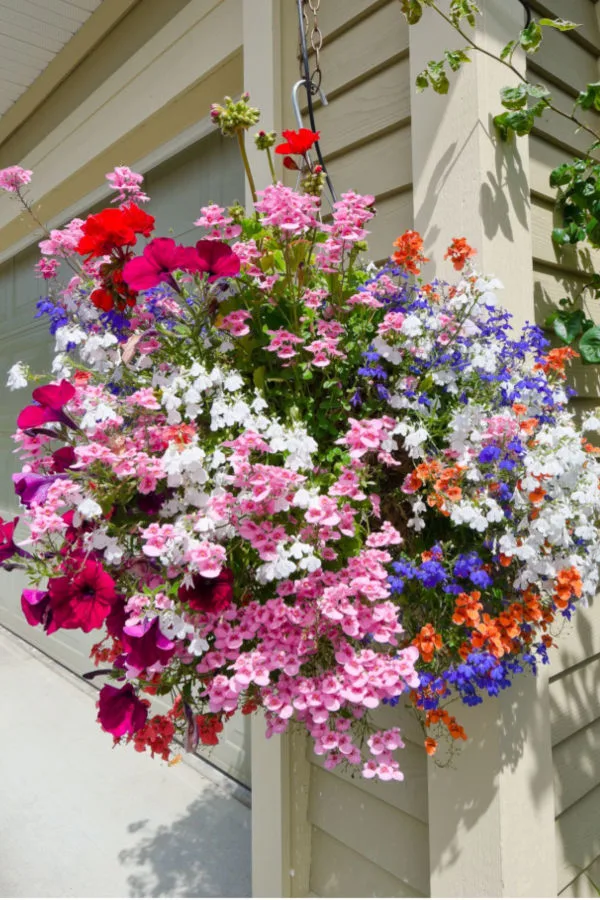
Trying to figure out why your hanging basket plants are starting to fail can be incredibly frustrating. How can a plant that was so full of life just a few weeks back start to fail so quickly? And when you consider just how much it can cost to purchase or plant your own baskets nowadays, it can be disheartening to think you might have to repurchase or replant again just months into the season!
But there is good news. Armed with just a few simple tips – you can almost always bring your baskets back to life. Even better, by employing those tips early enough, you can keep your baskets from ever struggling in the first place!
With that in mind, here is a look at the four major reasons hanging baskets often begin to fail – and how to fix them!
4 Reasons Hanging Baskets Often Struggle – And How To Fix Them!
#1) Lack Of Fertilizer
If there is one single factor beyond water that makes all the difference in keeping hanging baskets thriving – it’s fertilizing!
Hanging basket plants have a limited amount of nutrients within their soil. And once those resources become scarce, the plants will start to suffer. Annual flowers require a lot of power to keep flowering. Even if you use the best potting mix around, without additional power, your plants will use up the energy in the existing soil. And when they do, the foliage and blooms will start to fade.
Listen In Below To Our Podcast On How To Keep Your Hanging Baskets Blooming All Summer Long!
But here is the biggest key of all when giving power to hanging basket plants – what you use and how you apply the fertilizer will make a huge difference in their long-term success, or short term-failure!
The Simple Fix – 4 Reasons Hanging Baskets Struggle – And How To Fix Them!
First and foremost, to revive your baskets or to keep them thriving from the start, you need to fertilize regularly. As in every ten to fourteen days throughout the growing season. But that energy needs to be strong enough to power blooms and strong foliage, but not so strong to overgrow the plant.
Too much energy all at once will create roots that outgrow the basket quickly. Not only can an overdose of nutrients create a root-bound plant, it can actually also stop a plant from blooming. When a plant gets too much energy all at once, it simply begins to grow more foliage instead of flowers.
Light But Regular Fertilizing
The secret to success is applying lighter doses of power regularly. For best results, use an all-purpose liquid fertilizer at half-strength. This will allow you to fertilize your hanging baskets every ten to fourteen days to keep steady power for blooming and growth.
In place of commercial fertilizers, you can also use homemade compost tea or worm casting tea. These easy-to-make homemade liquid fertilizers provide the perfect amount of nutrients. Even better, with these low and slow liquids, you can use at full strength with each application without worry of overpowering.
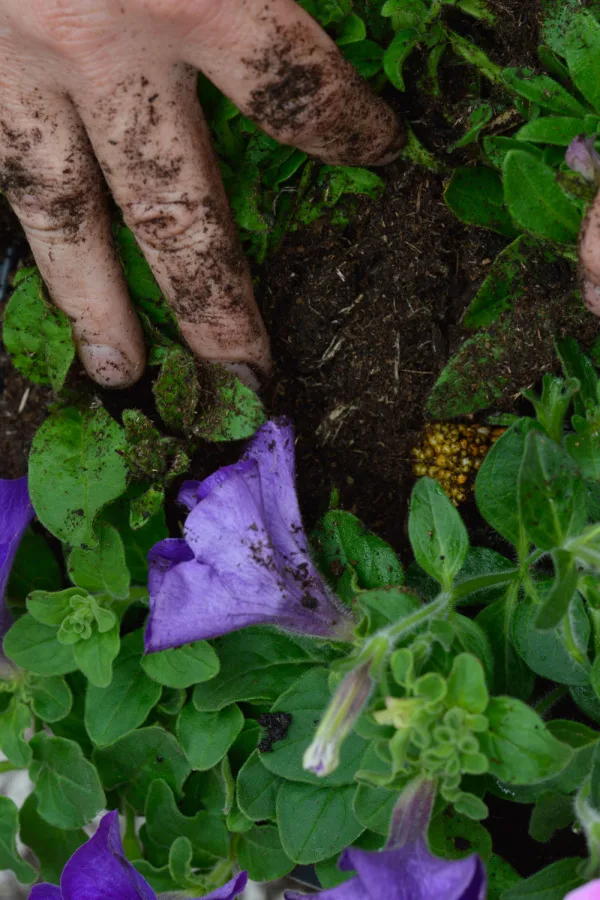
Finally, to really give low and slow power, apply a quarter cup of worm castings or aged compost to the top of the soil of your hanging basket plants every month. Every time you water your plants, you will be providing them with a slow release of nutrients that can absorb into the plant’s roots. Affiliate Link : Pure Worm Castings
It is the perfect one-two punch of power to keep your hanging baskets gorgeous from spring til fall!
#2) Over / Under Watering – 4 Reasons Hanging Baskets Struggle – And How To Fix Them!
Along with fertilizing, watering is the other biggest reason why hanging basket plants struggle. Or more to the point, inconsistent watering. Whether you are watering your plants too little or too much, both will cause big issues for your plants.
Over-watering plants will cause problems with a plant’s roots. If there is too much moisture around the roots all the time, they swell. When they do, they are not able to soak up the resources they need. This causes the plants to turn yellow and eventually rot away.
Under-watering, on the other hand, will cause the plants to dry out. In this case, the roots shrink, and again are unable to absorb and transfer the nutrients to the plant. This will lead to a weakening and drying out of the plant’s foliage, stems, and roots – and plant failure.
Allowing your plant to dry out too much and wilt – and then bring it back to life with a watering is a recipe for disaster. Each time it dries out that much – the roots sustain more damage.
The Simple Fix
The key to preventing under or over-watering is to check the soil’s moisture before watering each time. If your finger is dry about two inches below the soil, then it needs to be watered. On the other hand, if your finger has damp soil attached after checking, then you can hold off on watering.
If you are not sure with testing the soil with your finger, purchase an inexpensive soil moisture meter. They have a long probe to push down into the soil and instantly tell you the moisture level. They are actually a great tool to have all over the garden! Affiliate Link : Soil Moisture Probe
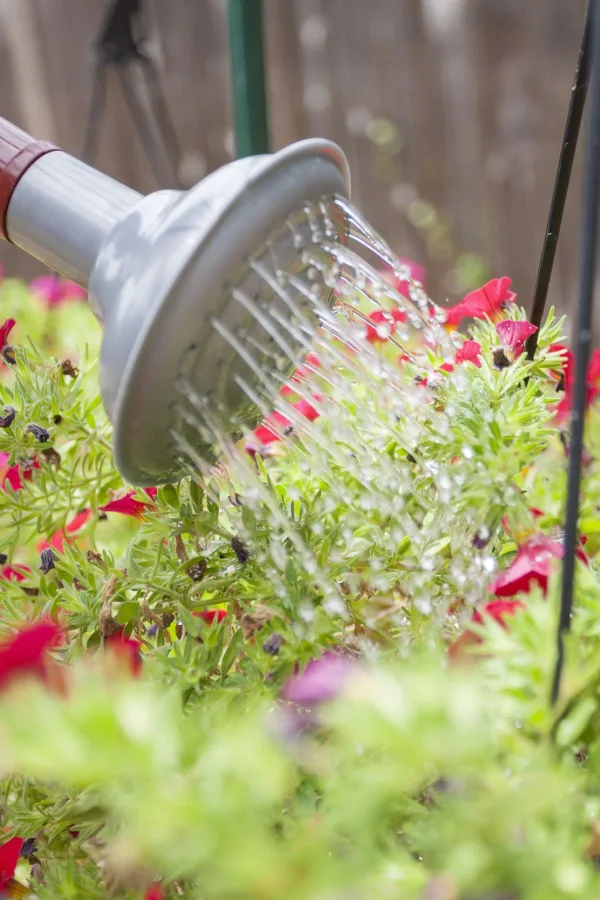
Typically, morning is the best time to water your hanging basket plants. It will help plants avoid drying out during the hottest time of the day as well as give the plants time to dry out before the cooler temperatures of the night.
Most hanging basket plants need to have water every single day. However, you may need to water twice a day during really hot spells in the summer months or when plants become overly large.
#3) Root Bound Hanging Baskets – 4 Reasons Hanging Baskets Struggle – And How To Fix Them!
Unfortunately, many times, a plant starts to struggle because it is already root bound. This happens quite often when you purchase big hanging baskets from stores in the early spring. These have often been growing for months to get them so beautiful so early – but their time in the basket is running out!
When a plant’s roots grow too much, they fill up the container. This leaves little to no room for soil. And without proper soil, the plants simply can’t soak up moisture or nutrients – even when you fertilize.
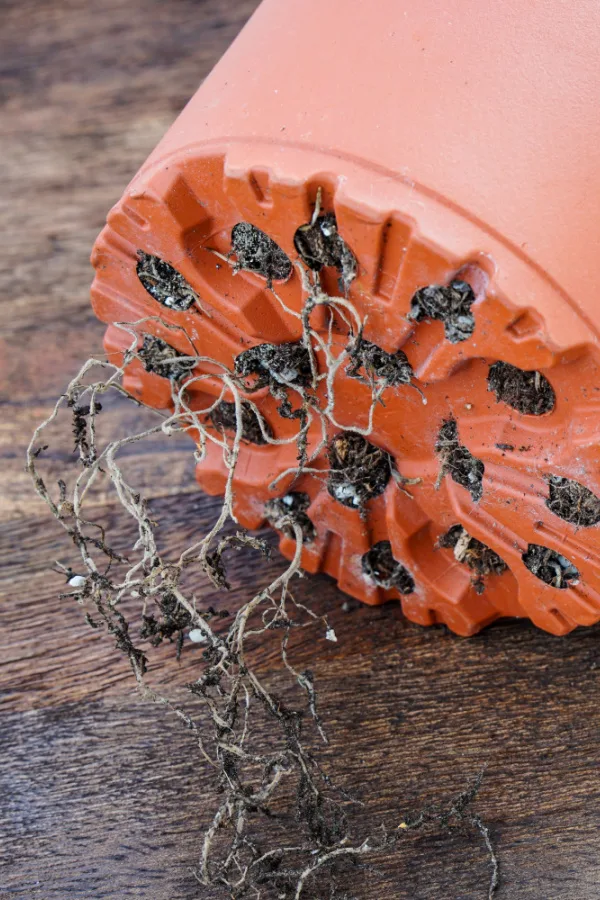
Have you ever watered your hanging basket plants just to see the water quickly flow right from the top and out the bottom? Chances are, the plant’s roots are overgrown. There simply isn’t enough soil to soak up the water. Instead, it just flows right past the roots and out of the container’s bottom.
You will often see root bound plants that come from nurseries and garden centers. They tend to pack a lot of plants into smaller, 10 to 12-inch containers to make them look full and beautiful. While the plants are stunning and overflowing, they are also usually overflowing below the soil as well.
The Simple Fix
The only fix for this issue is to replant your baskets into bigger containers. Go up in container size at least two to four inches when repotting. Some plants will struggle if you go up too much at one time, so a gradual increase in size is better than a huge jump.
Take time to carefully untangle the roots as much as possible. Cut off any roots that might be rotted (gray in color and soft). Use a brand new potting soil mix for the new container and place the plant inside. Fill in the space with extra soil and water well to help settle the soil around the roots.
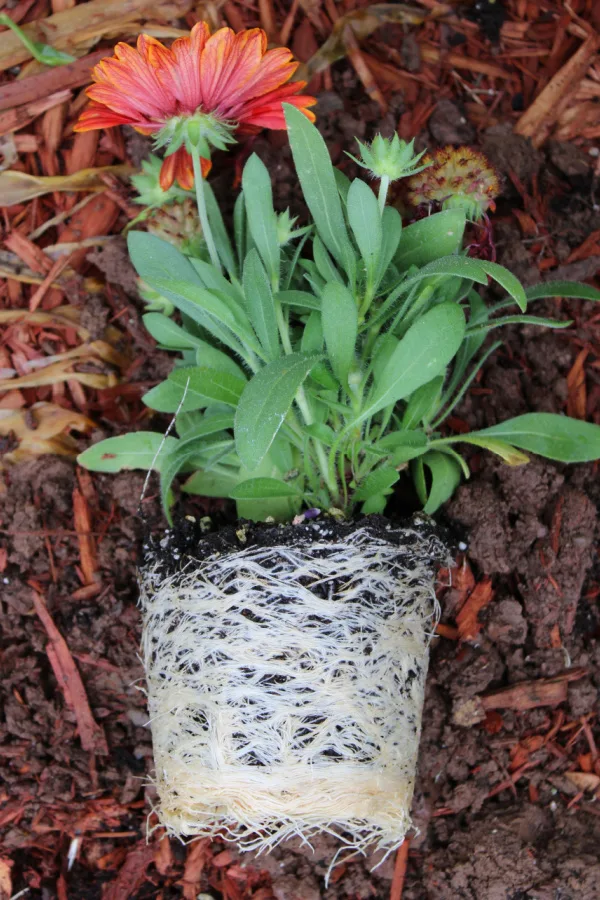
If your hanging baskets is overly large and you simply can’t re-pot it – don’t throw it out! Instead, remove it from its basket and plant it into a flowerbed. It will bloom and flourish – and at least you get to enjoy it until the end of the season!
#4) Location Matters – 4 Reasons Hanging Baskets Struggle – And How To Fix Them!
Finally, the last issue that is a big culprit in causing hanging basket plants to struggle is simply having them in a less than ideal location for the plants growing within them.
Different plants have different needs when it comes to sunlight. Some plants require full sun, which is at least six to eight hours each day. Flowers like petunias and lantanas need to be in full sun in order to thrive. Plants like impatiens and ferns, on the other hand, require more shade and less direct sunlight.
In addition to the amount of sunlight they receive, you also need to consider other natural elements like wind and rain. If you have a side of your home that always takes a beating from strong winds, your plant will likely start to suffer without some kind of protection.
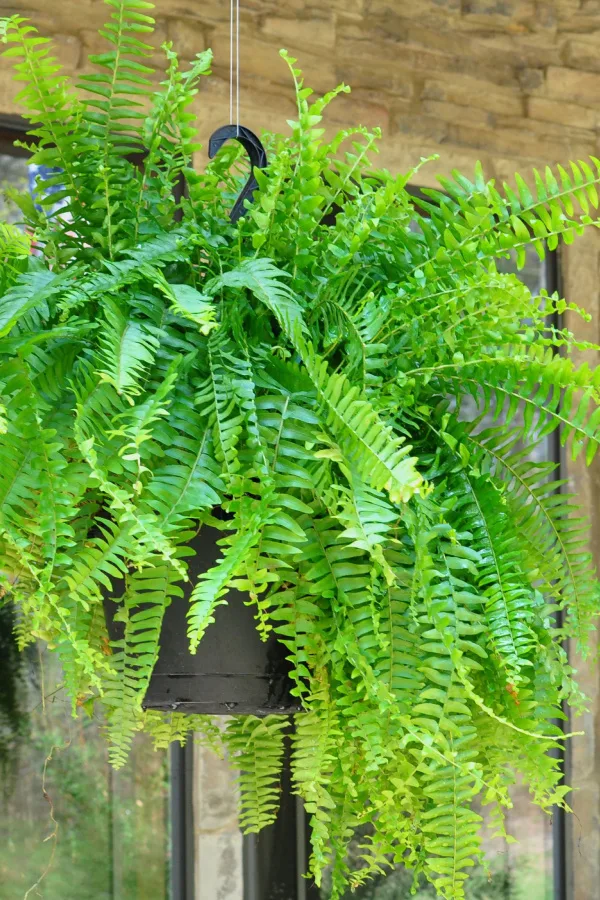
The Simple Fix
Always try to select plants that work for the location where you will be hanging them. You are only setting yourself up for disaster if you purchase a Boston fern or other sun-loving plant and are planning on hanging it on your sun-filled deck.
If you are creating your own hanging baskets from seeds or transplants, make sure to choose plants that have similar needs – meaning similar sunlight, moisture levels, and growth habits. Pair those plants together in one hanging basket and put them in the proper location based on their mutual needs.
Keep all plants out of harsh winds if possible, but this is especially true for taller or thinner hanging basket plants. This will help plants stay healthier and have less chance of breaking or being damaged.
By following these four simple tips, you will be able to prevent your plants from struggling and can enjoy your beautiful hanging baskets from early spring until fall comes around!
Follow Our Facebook Page For Even More Great Tips! Simple Garden Life Facebook Page
Simple Garden Life is a website dedicated to keeping gardening fun, simple and enjoyable! We publish two new articles each week along with a new garden podcast episode every two weeks. This article may contain affiliate links.
